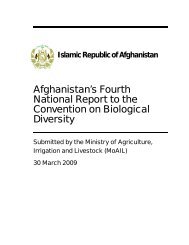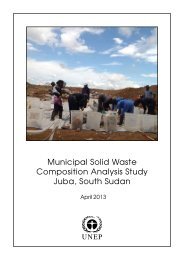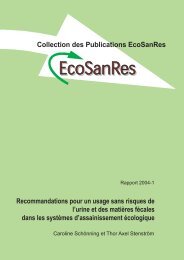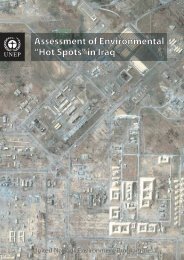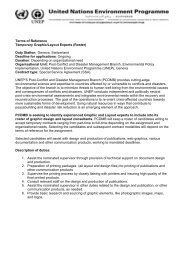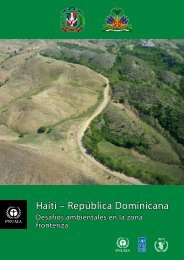private sector better informed. Customs personnelworking in both Ouanaminthe (<strong>Haiti</strong>) <strong>and</strong> Dajabon(<strong>Dominican</strong> <strong>Republic</strong>) listed the following areasthat require tighter regulation: charcoal, chemicals(agropesticides, hazardous wastes), plastic <strong>and</strong>other solid waste.Another acute political problem to address involvesthe legal <strong>and</strong> policy vacuum regarding the status,obligations <strong>and</strong> rights of the <strong>Haiti</strong>an traders operatingin <strong>Dominican</strong> territory <strong>and</strong> the inequity, abuse<strong>and</strong> corruption associated with their presence. Inshort, <strong>Haiti</strong>an traders often are or feel mistreated<strong>and</strong> exploited by <strong>Dominican</strong> authorities <strong>and</strong> byelements of the <strong>Dominican</strong> business community.During market days merchants <strong>and</strong> buyers fromboth countries are to be allowed to enter themarketplace on equal terms. 12 of the 14 marketsare, however, located on <strong>Dominican</strong> territory,creating some problems for <strong>Haiti</strong>an merchants,who carry both money <strong>and</strong> merch<strong>and</strong>ise. Thismakes them easy targets for thieves, <strong>and</strong> dishonestsoldiers <strong>and</strong> custom officials. <strong>Haiti</strong>ans have noright to complain, once they have crossed theborder, <strong>and</strong> no authorities to turn to for help, asno such authority exists on the <strong>Haiti</strong>an side. 283 Themain complaints of the <strong>Haiti</strong>an population, whenvisiting the bi-national markets on the <strong>Dominican</strong>side include: 284• Arbitrary fees dem<strong>and</strong>ed by customs <strong>and</strong>military officials.• High taxes dem<strong>and</strong>ed for places in the market,in the case of Belladère.• Confiscation <strong>and</strong> theft of <strong>Haiti</strong>an merch<strong>and</strong>ise.• Verbal <strong>and</strong> physical abuse, as well as unofficialcollection of taxes by soldiers <strong>and</strong> customsauthorities.• Un-paid debts by <strong>Dominican</strong>s who buy <strong>Haiti</strong>anmerch<strong>and</strong>ise on credit, <strong>and</strong> the inability of<strong>Haiti</strong>ans to get <strong>Dominican</strong> authorities to acton their behalf.Bi-national markets provide an opportunity for small scale farmers to sell their produce to inhabitants onboth sides of the border. A major problem, however, exist in respect to the lack of rights of <strong>Haiti</strong>an merchantsonce they have crossed the border into the <strong>Dominican</strong> <strong>Republic</strong>.© <strong>UNEP</strong>88 <strong>Haiti</strong> <strong>–</strong> <strong>Dominican</strong> <strong>Republic</strong>: Environmental challenges in the border zone
Case study 7. Cross-border trade in the market of Ouanaminthe <strong>–</strong> DajabónIn parallel with the formal trade between <strong>Haiti</strong> <strong>and</strong> the <strong>Dominican</strong> <strong>Republic</strong>, informal transactions between the twocountries have become increasingly important in recent years <strong>and</strong> attract merchants of both nationalities to severalof the bi-national markets. Studies conducted in 2001 estimated the value of official agricultural trade between thetwo countries to USD 10 million per year <strong>and</strong> the informal agricultural trade to USD 40-60 million. 285Of the 14 bi-national markets along the border, the market of Dajabón <strong>–</strong> Ouanaminthe is the main place for informaltrade between <strong>Haiti</strong> <strong>and</strong> the <strong>Dominican</strong> <strong>Republic</strong>. 286 This particular market also represents 56% of the total value of<strong>Haiti</strong>an informal exports to the <strong>Dominican</strong> <strong>Republic</strong>. 287 Between 2004 <strong>and</strong> 2005 over USD 5 million worth of productspassed from <strong>Haiti</strong> to the <strong>Dominican</strong> <strong>Republic</strong> through this market. 288The market is located mainly on <strong>Dominican</strong> territory <strong>and</strong> operates twice a week. Each market day, <strong>Dominican</strong> borderofficials allow <strong>Haiti</strong>an producers, sellers <strong>and</strong> consumers to cross the border without controlling their identification.Inside the market, a space is reserved for <strong>Haiti</strong>an merchants, who pay a certain sum for each square meter they use. 289The goods exchanged there are mostly agricultural produce. Mainly bananas, eggs, onions, shallots <strong>and</strong> mirlitons aresold by <strong>Dominican</strong>s to <strong>Haiti</strong>ans. <strong>Haiti</strong>ans sell mostly rice, green beans <strong>and</strong> garlic, but also seasonal products such asavocado, grenadia <strong>and</strong> bitter orange, to the <strong>Dominican</strong> <strong>Republic</strong>.Despite being by far the largestmarket, Dajabón <strong>–</strong> Ouanaminthe isnot specialized in the trade of animals,except for poultry. More than 50% ofthe trade in livestock (such as goat, beef<strong>and</strong> pork) happens in Hato Viejo. 37%of it happens in Tilory, <strong>and</strong> 11% of it inCapotille. In 2001, exports of animalsrepresented 11% of the value of totalexports from <strong>Haiti</strong> to the <strong>Dominican</strong><strong>Republic</strong>. 290The bi-national market of Ouanaminthe-Dajabon is the largest of the14 bi-national markets.© <strong>UNEP</strong>8.4 Rural population increase<strong>and</strong> transboundary migrationRural overcrowding, severe forms of environmentaldegradation, <strong>and</strong> lack of livelihood options on the<strong>Haiti</strong>an side of the border are driving transboundarymigration towards the <strong>Dominican</strong> <strong>Republic</strong>. Themanagement <strong>and</strong> treatment of <strong>Haiti</strong>an migrantsin the <strong>Dominican</strong> <strong>Republic</strong> is a high profiletransboundary issue. After the earthquake thenumber of <strong>Haiti</strong>ans living in the <strong>Dominican</strong><strong>Republic</strong> increased by 15%. <strong>Haiti</strong>an migrantsnow represent approximately 10% of the entire<strong>Dominican</strong> population. 291 The use of detrimentalpractices by the migrants, like those which havecaused much of the environmental degradationin <strong>Haiti</strong>, such as soil erosion <strong>and</strong> productivity losses,are now damaging areas on the <strong>Dominican</strong> sideof the border.At the same time, <strong>Haiti</strong>an migrant labour stronglysupports the <strong>Dominican</strong> economy through low-costlabour, while it provides livelihoods for hundreds ofthous<strong>and</strong>s of <strong>Haiti</strong>ans, which also is supportingthe <strong>Haiti</strong>an economy through remittances. Thelargest single problem for <strong>Haiti</strong>an migrant workersin the <strong>Dominican</strong> <strong>Republic</strong> is mistreatment <strong>and</strong>exploitation by their <strong>Dominican</strong> employers. This isparticularly acute for illegal migrants, who makeup the majority of working migrants since the postearthquake surge of 2010. Problems noted includea failure to pay salaries, poor work <strong>and</strong> livingconditions, forced expulsions, <strong>and</strong> intimidation.It is a particular problem in the border area. The<strong>Dominican</strong> side of the area has a high populationof <strong>Haiti</strong>an agricultural laborers <strong>and</strong> the border poststhemselves are flashpoints for abuse <strong>and</strong> conflict.<strong>Haiti</strong>ans returning home after a period of illegalwork in the <strong>Dominican</strong> <strong>Republic</strong> are frequently both<strong>Haiti</strong> <strong>–</strong> <strong>Dominican</strong> <strong>Republic</strong>: Environmental challenges in the border zone89
- Page 1:
Haiti - Dominican RepublicEnvironme
- Page 7 and 8:
We congratulate all those who contr
- Page 9:
countries. These issues include the
- Page 13:
The differing levels of tree cover
- Page 16 and 17:
A member of the assessment team col
- Page 18 and 19:
Members of the assessment team inte
- Page 20 and 21:
Consultation workshops were held in
- Page 22 and 23:
Table 1. Key facts and statistics f
- Page 24 and 25:
wandering over depleted fields and
- Page 26 and 27:
ClimateThe different parts of Hispa
- Page 28 and 29:
Natural river flow variability due
- Page 30 and 31:
EarthquakesHispaniola is located on
- Page 32:
consumption and production culture
- Page 36 and 37:
Map 6. The northern coast and the M
- Page 39 and 40: Map 8. The area surrounding the lak
- Page 41 and 42: although it is estimated to be much
- Page 43 and 44: Figure 3. Seasonality of food insec
- Page 45 and 46: e sold for a profit on the other si
- Page 47 and 48: viCase study 2. Comité Intermunici
- Page 49 and 50: Part 2 Identification andAnalysis o
- Page 51 and 52: and local issues. These include, fo
- Page 53: Lacking productive topsoil this lan
- Page 56 and 57: 5 Forest resources andterrestrial p
- Page 58 and 59: Satellite image 3. In the Massacre
- Page 60 and 61: un the risk of being either impriso
- Page 62 and 63: eing transported from the Dominican
- Page 64 and 65: 5.5 Collection of fuel woodFuel woo
- Page 66 and 67: !^5.6 Protected area management and
- Page 68 and 69: locations is contrasted with a degr
- Page 70 and 71: Enough is known, however, to be cer
- Page 72 and 73: plantations that the habitat will n
- Page 74 and 75: Satellite image 6. Just before reac
- Page 76 and 77: interventions if well designed do w
- Page 78 and 79: contaminated rivers are disease vec
- Page 80 and 81: crust substantial enough to be the
- Page 82 and 83: 7 Coastal and marineresources7.1 In
- Page 84 and 85: tuna, sea bream, yellowtail, hake,
- Page 86 and 87: Mangroves are being cut to be sold
- Page 88 and 89: Case study 6. Cooperation between f
- Page 92 and 93: carrying money, and missing their d
- Page 94 and 95: etween these two cordilleras), but
- Page 96: Mineral exploration is starting in
- Page 99 and 100: assessment team are all small scale
- Page 101 and 102: Extreme poverty is a key driving fo
- Page 103 and 104: it is present. The Haitian populati
- Page 105 and 106: Atlantic storms will double in the
- Page 107 and 108: A charcoal kiln burning inside the
- Page 109 and 110: Table 5. Summary of the key recomme
- Page 111 and 112: Ten recommendations are provided un
- Page 113 and 114: oth environmentally damaging and li
- Page 115 and 116: Improving cooperation and governanc
- Page 117 and 118: f. Create and formalize fishing agr
- Page 119 and 120: g. In the long term, aim for variou
- Page 121 and 122: Haiti - Dominican Republic: Environ
- Page 123 and 124: Annex I - Report terminologyArgumen
- Page 125 and 126: Annex II - List of Acronyms and Abb
- Page 127 and 128: Annex IV - Table connecting thereco
- Page 129 and 130: 23. United States Census Bureau. (2
- Page 131 and 132: 73. UN Development Programme - Haï
- Page 133 and 134: 117. Urban Design Lab, Columbia Uni
- Page 135 and 136: 161. Miniel, L. (2012, 20 April). I
- Page 137 and 138: 204. Peralta, C. (2012, 18 April).
- Page 139 and 140: 246. González Sánchez, F.F. (2012
- Page 141 and 142:
290. Laboratoire des Relations Hait
- Page 143 and 144:
Annex VI - AcknowledgementsContribu
- Page 145 and 146:
Claude PhanorMartin RapillyAdelita
- Page 147 and 148:
José Cristino CastilloRobert Crowl
- Page 149 and 150:
www.unep.org/disastersandconflicts




